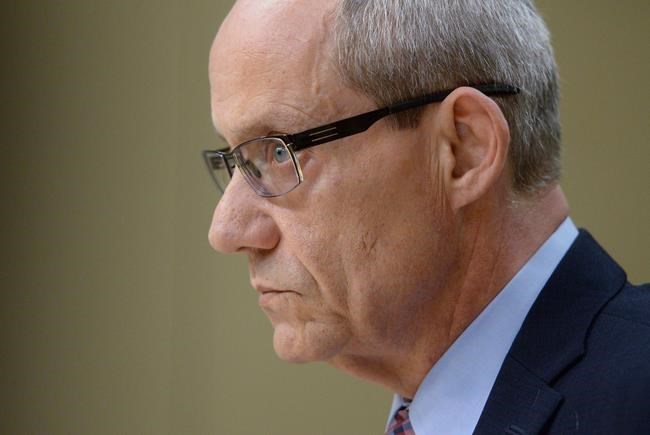OTTAWA — Former military ombudsman Gary Walbourne told a parliamentary committee Wednesday that he informed Defence Minister Harjit Sajjan of allegations of misconduct against Gen. Jonathan Vance during a “hostile” closed-door meeting three years ago.
Walbourne’s remarks appear to contradict Sajjan’s own testimony to the same committee Feb. 19, when he said he was as surprised as anyone when Global News first reported Vance’s alleged misconduct in early February.
At that time, Sajjan repeatedly refused to confirm media reports that Walbourne raised allegations against Vance when the minister and ombudsman met in March 2018.
Sajjan cited confidentiality and also said any allegations brought to him were taken seriously and referred to the appropriate authorities.
Walbourne, whose testimony is protected by parliamentary privilege, used his opening statement to the House of Commons' defence committee to publicly confirm the conversation for the first time.
“Yes, I did meet with Minister Sajjan on March 1, 2018,” he said. “Yes, I did directly tell him about an allegation of inappropriate sexual behaviour made against the chief of defence.”
In a written statement released after the committee meeting, Sajjan said he disagreed "with parts of the testimony that occurred in committee today."
"As I have stated, I was as shocked as everyone else at the allegations that were made public last month," he said.
"I can assure the committee, and all Canadians, that any allegations that were brought forward were very quickly put forward to the proper authorities, while respecting the need to protect the privacy of any individuals involved. Any suggestion that I have done otherwise is wrong.”
Global News has reported that Vance allegedly had an ongoing relationship with a woman he significantly outranked. He is also accused of having made a sexual comment to a second, much younger, soldier in 2012, before he became commander of the Armed Forces.
Vance, who turned over command of the military in January after more than five years in the job, has not responded to requests for comment by The Canadian Press and the allegations against him have not been independently verified.
Global says Vance, who as defence chief oversaw the military’s efforts to root sexual misconduct from the ranks, has denied any wrongdoing.
Military police are now investigating the allegations against Vance. They have also launched an investigation of Vance’s successor as defence chief, Admiral Art McDonald, who temporarily stepped aside last week in response to unspecified allegations of misconduct.
Walbourne, whose appearance showcased the combative attitude that marked his more than four years as military ombudsman, did not spell out the details of the allegation that he presented to Sajjan.
He also confirmed earlier reports that no formal complaint was filed, but told MPs he came to possess “irrefutable, concrete evidence” about Vance, which is what led him to raise the matter with Sajjan.
“I did not give the minister the details of the allegation,” the former ombudsman said. “I tried to show him some evidence. He refused to look at it.”
Walbourne, who is now the ombudsman at Lakehead University in Thunder Bay, Ont., told the committee Sajjan later cut off all contact until the former ombudsman’s resignation on Oct. 31, 2018.
“After this meeting, there were over a dozen requests from myself to the minister to meet. All were rejected,” he said. “And I never spoke to minister said again. This meeting was very hostile and ended bitterly.”
Walbourne also said he asked Sajjan to keep the matter in confidence until they could figure out how to handle the allegation, but that the minister instead told the Privy Council Office, which asked the ombudsman for information about the complainant.
Walbourne, who initially declined an invitation to appear before the committee before being formally summoned to testify, said he refused to provide that information because the complainant had not given permission to do so.
Liberal committee members repeatedly asked Walbourne what they expected Sajjan to do after notifying him of the allegations, and suggested the minister had acted promptly and appropriately by notifying the Privy Council Office, a bureaucratic operation that supports the prime minister and cabinet.
Walbourne said he was looking for “top cover” from the minister so he could go back to the complainant and discuss lodging a formal complaint against Vance. The former ombudsman went on to blast Sajjan for having told the PCO about the allegations.
Opposition MPs suggested Sajjan not only failed to take action when presented with the allegations, but in the words of NDP defence critic Randall Garrison, “was not frank with us in his appearance before the committee.”
The former ombudsman, who repeatedly decried a lack of independence for the office, also drew a link between his meeting with Sajjan three years ago and the Department of National Defence cutting off his financial and staffing authorities.
The ombudsman's office was being investigated at that time following a whistleblower’s complaint. Walbourne was adamant the complaint had no merit, and instead alleged that it was used as an excuse to put pressure on him and his team.
Asked if there was any attempt by the government to cover up for Vance, Walbourne said: “I don’t know if it was an attempt at a coverup, but I know it was a full-court press to get rid of me.”
Walbourne said there is a need for independent oversight of the Canadian Armed Forces, echoing testimony raised by other witnesses in recent weeks, suggesting it is essential for eliminating sexual misconduct in the ranks.
“Others have come before me and said that it's cultural change,” he said. “But until the government of Canada makes a decision to get this right, we're going to have this conversation again in six months.”
This report by The Canadian Press was first published March 3, 2021.
Lee Berthiaume, The Canadian Press



